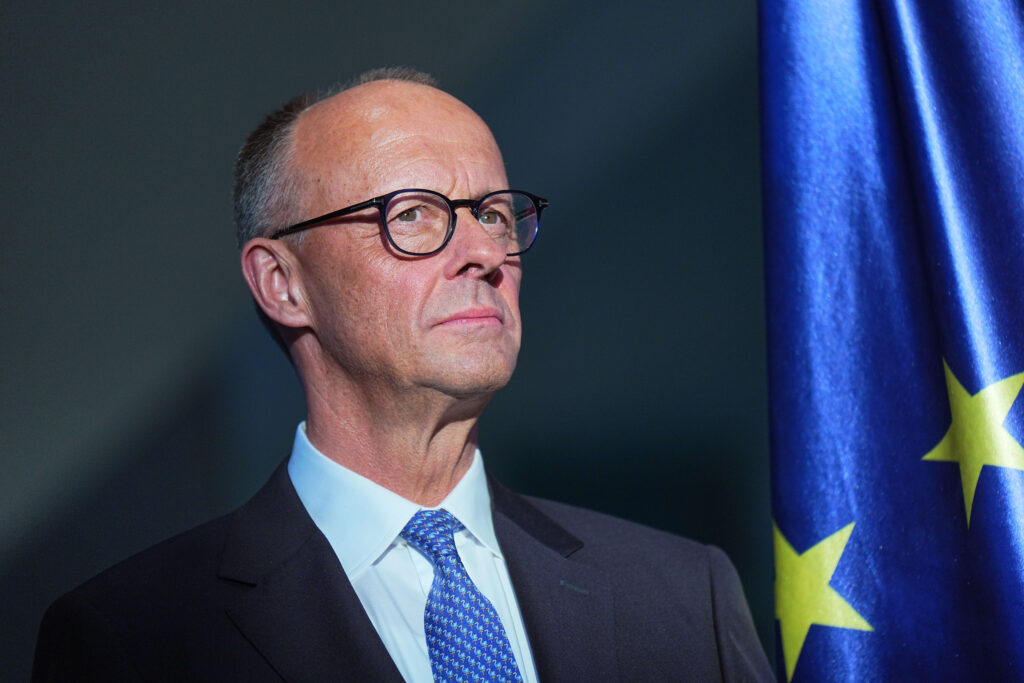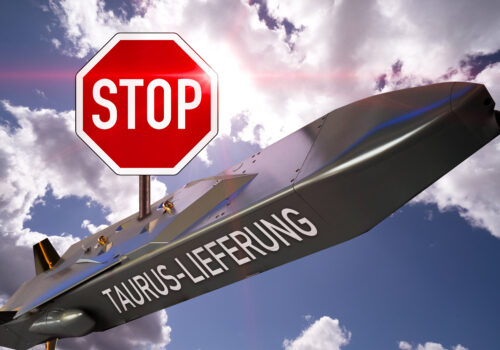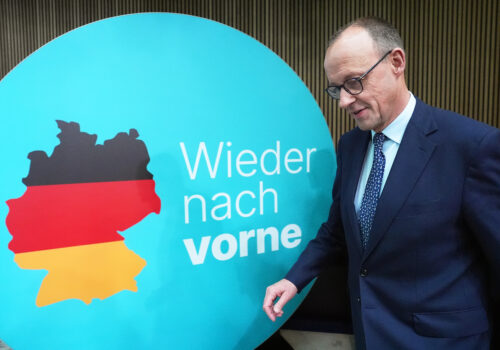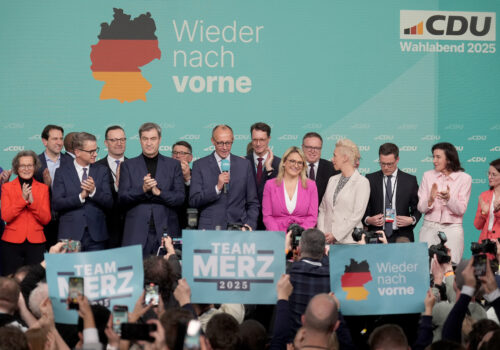After an Odyssean, two-decade journey, Friedrich Merz has arrived as Germany’s tenth chancellor. But instead of the expected Krönung, a coronation, members of the Bundestag gave him a shot across the bow on Tuesday. For the first time in modern German history, it took two rounds of voting to elect a chancellor. This, of course, is not fatal for Merz, but this short-lived saga shows that political instability in Europe’s largest economy and reluctant hegemon may not be over, despite Merz’s promises to the contrary. The next government is taking office weakened at a time when Germany and Europe can least afford it.
In the first vote, Merz missed the required support of 316 members of the Bundestag by just six votes, although the coalition of Merz’s Christian Democrats (CDU/CSU) and Social Democratic Party (SPD) theoretically holds a slim majority of 328 in parliament. In the second round, Merz received 325 votes. Dissent is not unusual among coalition parties, of course. Dozens of members of the Bundestag refused to vote for Chancellor Angela Merkel in years past, too. The current coalition, however, promised to restore Germany’s predictability and credibility in Europe, a promise that has taken some damage now.
It may be impossible to figure out why Merz lost those votes in the first round. Members of the Bundestag elect the chancellor in a secret ballot. The fact that he is a polarizing figure, however, was well known beforehand. Shortly after winning the snap elections in February, some in the SPD and even the CDU/CSU began to question whether Merz had what it takes to be chancellor. On the SPD’s side, many were annoyed by the personal attacks against outgoing Chancellor Olaf Scholz and the CDU’s anti-migration campaign. In particular, young, left-leaning members of the SPD’s Bundestag group may have felt sidelined by Lars Klingbeil, the SPD’s co-chairman and Merz’s designated vice chancellor, and some of them may have withheld their support for Merz in the first round.
This will not go unnoticed in Moscow, Beijing, or Washington.
The euphoria surrounding Merz was also muted in his own party. Some conservatives criticized Merz for doing an about face on central campaign promises, including his push for a massive special fund for infrastructure and debt brake reforms even before he entered office. Some moderate party members were apparently displeased by Merz’s populist style and fierce criticism of Merkel. Many felt he gave up too much ground on critical CDU issues in the coalition negotiations. The question is whether those members of parliament who voted against Merz in the first round simply meant to send a warning shot or whether the resistance is more deep-seated. If it is the latter, then it could destabilize the government every time controversial issues and complex compromise deals are up for a vote.
Germany’s incoming foreign minister, Johann Wadephul, described the day’s voting as “an obstacle, but not a catastrophe.” That is true, but the unexpected first-round defeat will affect how many Germans and foreign capitals view Merz and his coalition.
Merz promised to govern with professionalism and strength, to reassure markets, and assume the international leadership necessary for navigating current crises. On Monday, upon presenting the signed coalition agreement, Merz tried to project that strength, saying “this government is determined to move Germany forward through reforms and investments.” He added that Germany’s voice would be “heard in Europe and the world.” Instead, Tuesday’s vote and the dissension against Merz from his own ranks suggests Germany’s next leadership will continue to struggle with fragility, division, and indecisiveness. This will not go unnoticed in Moscow, Beijing, or Washington. Markets took note as well; the DAX 40 fell on news of the first vote, only to claw back most of its losses following the second vote.
The concern is that Tuesday’s votes may be a sign of things to come for the coalition’s ability to drive difficult reforms. More to the point, it raises questions of trust between the chancellor and his vice chancellor. Merz and Klingbeil displayed a united front in recent weeks, but they have shown that they are not in full control of their parliamentary groups. Both parties have already blamed each other publicly, and the coalition peace has become passé on day one, pointing to rocky years ahead.
At best, this is a blip, soon to be forgotten as Merz takes over the chancellorship. He will certainly try to frame it as such when he visits his counterparts in France and Poland on Wednesday. But at worst, an uncertain majority in parliament means Merz and the government risk becoming a lame duck immediately. This is bad news for Europe, which needs unity and strength to avoid paralysis on critical issues, including a potential transatlantic trade war and a much-needed European response to the war in Ukraine. Much will depend on Germany’s defense spending, its leadership in Europe, and its relationship with China.
One risk is clear: the next government will have the weakest mandate in modern history at a moment when strength is needed the most, and the instability of previous years could continue, to the detriment of Germany and Europe.
Merz should quickly move beyond Tuesday’s embarrassing start and keep his focus on what comes next. “The most important thing for me is that ten years from now, we are still a country that enjoys freedom and peace,” Merz said in his first interview as chancellor. “But freedom and peace are in danger,” he warned. His first priority, he added, would be to restore both. Merz also said that his government will move swiftly to address deep structural changes the economy is undergoing and restore its industrial power. But after Tuesday’s events, Merz must provide more concrete, ambitious measures to reassure markets and allies that he can govern with a more stable hand than his predecessor. Merz can reassert himself on foreign and security policy, on which the coalition agreement remained unexpectedly thin, with a joint Franco-German-Polish initiative in support of Ukraine, for example. A quick-action agenda for the first hundred days, driving forward the coalition’s, Leuchtturmprojekte, or key “lighthouse” initiatives, can restore confidence that German leadership is back under Merz. This way, it is not the start of the new government that is remembered but its subsequent successes.
Jörn Fleck is the senior director of the Atlantic Council’s Europe Center.
Jurek Wille is a student of international relations at Johns Hopkins SAIS. Before joining SAIS, he worked for the German government.
Further reading
Thu, Apr 17, 2025
Putin is attempting to intimidate Merz with yet more Russian red lines
UkraineAlert By Peter Dickinson
As Germany’s next chancellor Friedrich Merz prepares to boost support for Ukraine, the Kremlin is already seeking to deter him with intimidation tactics, writes Peter Dickinson. Merz's response will help define whether he is capable of leading Europe.
Fri, Feb 28, 2025
How Merz can leverage Germany’s green transition for growth and security
New Atlanticist By Carol Schaeffer
Cutting back on green policies would be an economic and strategic mistake. The incoming German government can either seize the momentum or let others lead the way.
Sun, Feb 23, 2025
Germany shifts rightward: Our experts answer the big questions about the country’s election
New Atlanticist By
Our experts explain what the outcome of Germany’s elections will mean for policymakers in Berlin, Brussels, and Washington.
Image: The new Federal Chancellor Friedrich Merz (CDU) speaks during the handover of office in the Chancellery. Michael Kappeler/dpa via Reuters Connect.



